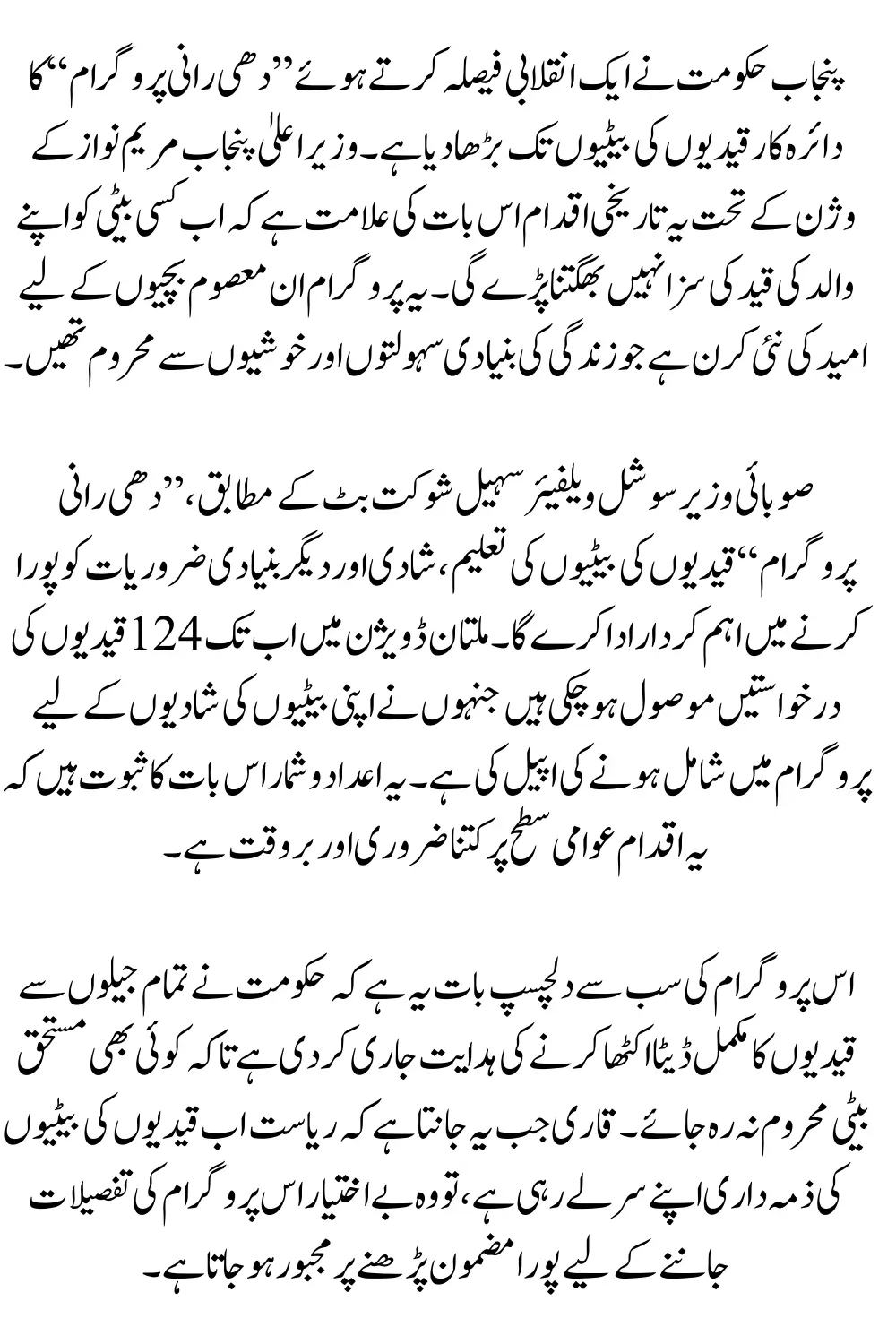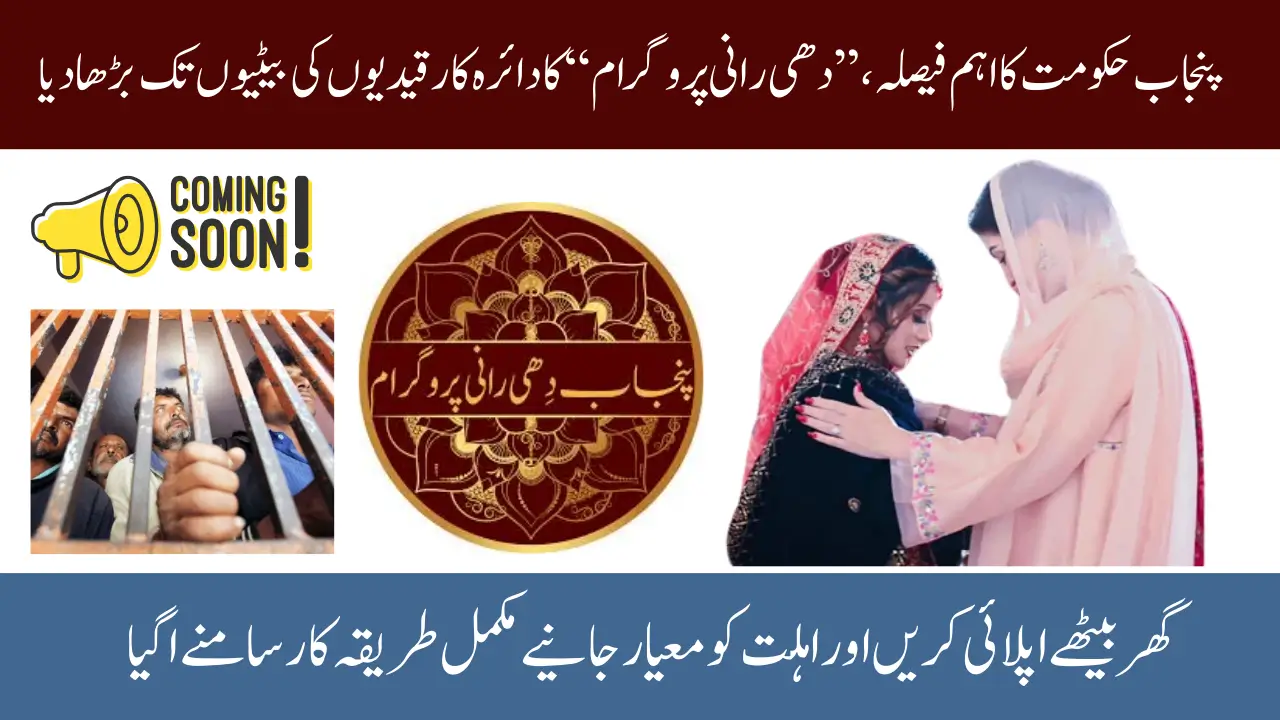Dhi Rani Program to Prisoners Daughters
The Dhi Rani Program is one of Punjab’s most important social welfare initiatives aimed at supporting daughters across the province. Originally designed to provide assistance for girls from underprivileged backgrounds, the program has now been expanded to cover an even more vulnerable group the daughters of prisoners.
The expansion reflects the Punjab government’s commitment to ensure that no girl is left behind due to her family’s circumstances. Many children of prisoners often face social stigma, financial hardship, and lack of opportunities. The government’s decision to include them in the Dhi Rani Program is a step toward giving them equal rights, dignity, and access to life’s basic necessities.

Leadership and Vision Behind the Dhi Rani Program
This expansion is directly linked to the vision of Punjab Chief Minister Maryam Nawaz. She has repeatedly emphasized that every daughter deserves equal love, respect, and support, no matter what her family background may be.
By extending the Dhi Rani Program to prisoners’ daughters, Maryam Nawaz has set a clear example of compassionate leadership. The initiative has been described as historic and revolutionary because it goes beyond traditional welfare approaches. It acknowledges the struggles of families affected by imprisonment and ensures that daughters are not punished for circumstances outside their control.
BISP 8171 Verification September 2025 Complete CNIC Check and Payment Guide
The Chief Minister’s vision makes one thing clear: Punjab stands with its daughters.
Official Announcement of the Dhi Rani Program Expansion
The announcement was made by Provincial Minister for Social Welfare and Bait-ul-Maal, Suhail Shaukat Butt. While addressing the media, he explained how the Dhi Rani Program will now serve as a ray of hope for prisoners’ daughters.
He also stressed that many of these girls suffer quietly, facing difficulties in education, marriage, and even daily living expenses. With their fathers in jail, they often lack both financial and emotional support. The expansion of the program ensures that such daughters will no longer be left behind.
This initiative is more than financial aid it is a symbol of compassion and inclusion.
Implementation Steps within the Dhi Rani Program
For the Dhi Rani Program to succeed, clear implementation steps have been outlined:
- Collection of Prisoners’ Data
- The Social Welfare Department has instructed all Regional Directors to collect detailed data of prisoners in Punjab’s jails.
- This data will include personal details of the prisoner, family background, and the number of daughters eligible for the program.
- Eligibility Screening
- After data collection, the department will verify which daughters meet the criteria for inclusion.
- This ensures that support reaches only those who truly need it.
- Inclusion into the Program
- Eligible daughters will be officially enrolled in the Dhi Rani Program.
- They will then become entitled to benefits such as marriage support, financial assistance, and welfare facilities.
- Monitoring and Transparency
- Regular monitoring will be carried out to make sure the funds and support are distributed fairly.
- Transparency will be maintained at every step to prevent misuse of resources.
This systematic approach guarantees that the Dhi Rani Program is implemented smoothly and benefits reach the right families.
Complete Eligibility Criteria for Benazir Kafalat Program with Registration Details
Applications and Early Response to the Dhi Rani Program
The initial response to the expanded Dhi Rani Program has been very positive. In Multan Division alone, 124 prisoners have already submitted applications for their daughters’ marriages under the program.
This overwhelming response highlights two key points:
- Families are in urgent need of such support.
- People trust the government’s commitment to fulfilling this promise.
It also indicates that the Dhi Rani Program has touched the hearts of communities who had long been waiting for recognition and support.
Step-by-Step Guide: How Prisoners’ Families Can Apply
For families of prisoners, understanding the procedure is important. Here is a simple guide to applying for the Dhi Rani Program:
- Data Collection at Jail Level
- Prison authorities will work with Social Welfare officers to gather family details of prisoners.
- Prison authorities will work with Social Welfare officers to gather family details of prisoners.
- Submission of Application
- Prisoners or their family members can submit a formal request for inclusion in the Dhi Rani Program.
- Applications usually involve basic identification documents and details of the daughters.
- Verification by Social Welfare Department
- After submission, officials will verify the information.
- Only genuine cases will be approved to maintain fairness.
- Approval and Inclusion
- Once approved, the daughter(s) will officially become part of the Dhi Rani Program.
- Benefits will be provided as per eligibility, such as marriage assistance, education support, and financial help.
Families are encouraged to stay in contact with their Regional Social Welfare Offices for updates and assistance during the process.
Expected Impact of the Dhi Rani Program on Beneficiaries
The Dhi Rani Program is expected to bring significant positive changes in the lives of prisoners’ daughters:
- Marriage Support: Financial assistance will help ensure their weddings are conducted with dignity.
- Education Opportunities: With government backing, daughters will be able to continue their education without financial burden.
- Social Uplift: The program reduces the stigma attached to being a prisoner’s child, showing society that the government stands with them.
- Emotional Security: Knowing that the state supports them brings confidence and hope to families living in distress.
This impact goes beyond material help it restores dignity, self-worth, and hope for a better future.
Conclusion
The expansion of the Dhi Rani Program is a clear demonstration of Punjab’s commitment to social welfare and equality. By including prisoners’ daughters, the government has proven that no one will be left behind because of circumstances they cannot control.
Chief Minister Maryam Nawaz’s vision has turned into a practical reality that is already bringing relief to families across the province. As applications grow and more daughters are enrolled, the Dhi Rani Program will continue to stand as a symbol of compassion, inclusion, and progress.
FAQs
What is the Dhi Rani Program in Punjab?
The Dhi Rani Program is a social welfare initiative launched by the Punjab government to support daughters, especially those from underprivileged families. Recently, it has been expanded to cover prisoners’ daughters as well.
Who announced the expansion of the Dhi Rani Program?
The expansion was announced by Provincial Minister for Social Welfare and Bait-ul-Maal, Suhail Shaukat Butt, under the vision of Punjab Chief Minister Maryam Nawaz.
How can prisoners’ families apply for the Dhi Rani Program?
Families of prisoners can apply by submitting their details through the Social Welfare Department. Applications are verified using jail records, and once approved, daughters are enrolled in the program.
What kind of support is provided under the Dhi Rani Program?
The program provides marriage assistance, educational support, financial help, and other welfare facilities to ensure that daughters are not deprived of basic rights due to their parents’ imprisonment.
How many applications have been received so far under the Dhi Rani Program?
In Multan Division alone, 124 applications have been submitted by prisoners for their daughters’ marriages. This number is expected to grow as awareness increases.
